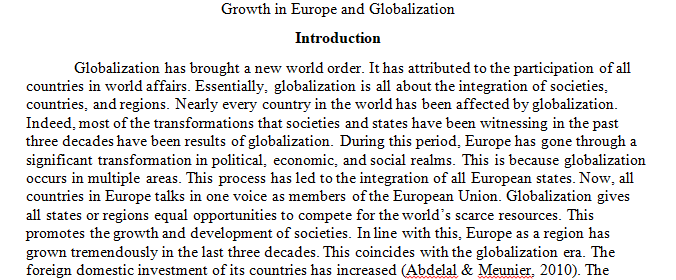
Explain and analyze growth in Europe and globalization.
Growth in Europe and Globalization
Power sharing in deeply divided societies
-Deep divisions in society may be caused by such factors as language, religion, race, and social class A society is deeply divided if its subgroups have strong identities and hostile feelings among them. In Europe, Northern Ireland, Belgium, Spain, Bosnia-Herzegovina, and Kosovo are clear examples of this type of societies.
-Democratic stability can be attained in such deeply divided societies by the sharing of power among the deeply divided groups. This theory of power sharing is called “consociational” theory. I could be defined as a form of democracy which seeks to regulate the sharing of power in a state that combines diverse societies (different ethnic, religious, political, national, regional or linguistic groups), by allocating these groups collective rights. This sharing of power is mainly characterized by executive-power sharing, proportional representation, veto rights, and segmental autonomy for minority groups. Consociational democracies stand in contrast to competitive majoritarian democracies which are characterized by voting mechanisms whereby a majority can impose its will upon a minority.
-The Consociationalist approach consists of accommodating minorities by granting them collective rights. Consociational democracies take different forms and the division of power between the central government the autonomous political regions varies.
-Countries that operate or have operated on a Consociationalist basis include Austria, Belgium, the Netherlands and Switzerland; in these countries’ leaders were able to practice accommodating decision-making.
-Other examples of power-sharing (consociational) include peace agreements such as the Dayton Agreement that ended 1992-1995 war in Bosnia and Herzegovina, the Belfast Agreement of 1998 in Northern Ireland and its subsequent reinforcement with the 2006 St. Andrews Agreement, and the Obrid Agreement of 2001 setting the constitutional setting for power sharing in the Republic of Macedonia. Czechoslovakia was a consociational democracy from 1989 until its partition in 1993.
-One criticism of this type of democracy is that ordinary citizens have too little say in the decision-making process if the elites work so closely together. One interesting example of citizen participation took place in 2000 in the deeply divided town of Srebrenica in Bosnia-Herzegovina, where Serbs and Bosniaks (Muslims) experience the worst massacre in 1995 since WWII. Two groups of ordinary citizens were assembled to discuss ways to improve to improve life in the country. The result was that citizens were more able to deliberate across the deep divisions than the local politicians, who were more interested in keeping their power in insisting in the deep divisions.
-The lesson of this example is that in order to overcome deep divisions it is effective to involve ordinary citizens to find solutions. For power-sharing democracies to attain better outcomes these elements should be included: civil liberties, citizen participation, competitive elections, absence of violence, civility in political discourse and deliberation, respect for minorities, and equal opportunity.
Explain and analyze growth in Europe and globalization.
13 hours ago
REQUIREMENTS
2 pages, Single Spacing Miami Dade College
Political Science
Answer preview……………..

apa 1360 words